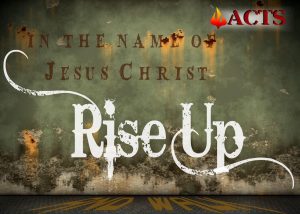
It is difficult because I know that I will preach to families who have not experienced healing. I will preach to the grandparents whose 7-day old granddaughter, born at 22 weeks, couldn’t make it to 8 days. I will preach to the family and the young man who has journeyed with cancer for seven years and it has returned. I will preach to the family who just accidentally ran over their 19 month old child. I will preach to myself whose son lives with autism and whose sister-in-law died of CF in her forties.
One of our mantras at Grace is “Blessed to be a Blessing.” While I believe this to be a helpful saying, based in the narrative of God’s promise to Abram that God will be with him and for him, for the sake of the world, through it all, I fear that the statement can be misheard and misused.
We are Americans. We live in the wake of a Civic Religion that has convinced us that white, Anglo-Saxon people are God’s Chosen ones and our manifest destiny is to expand westward across North America. We live in the wake of American Prosperity Gospel that has commandeered the term “blessed” to mean “if I have enough faith and positive mental energy, then I can get God to do what I want God to do for me.”
Rolf Jacobson, a prof at Luther Seminary and voice on the Narrative Lectionary podcast, spoke to this issue very poignantly this week. He mentioned the New York Times article by Kate Bowler titled “Death, The Prosperity Gospel, and Me”. I recommend you read it. She has spent much of her academic career as a historian of the Prosperity Gospel movement. She was recently diagnosed with stage 4 cancer. This article reflects on her cancer and the prosperity Gospel.
What do I do? I believe that Peter and John did, in fact, heal this man. I also believe that God does not heal everyone. I also don’t believe that there is a direct correlation between faith and healing. I have known too many faithful people who have died because of disease or accident to believe that.
Peter’s miracle serves a specific purpose in Acts. It mimics Jesus’ ministry. It is a sign of God’s emerging Kingdom. The event evoked a public discourse in Jerusalem. The religious leaders were confronted with the reality that, even though they killed Jesus, his mission lived on in his followers. The Kingdom of God is on the loose.
The question that continually jumps out at me from this passage is this. If the crippled man had been sitting at this gate his whole life, why didn’t Jesus heal him when he walked past him? We must assume that the man had seen Jesus walk into the temple every time he did, for over thirty years.
Jesus didn’t heal everyone. Hmmm…
The most powerful part of this story, for me, is not the physical healing of the crippled man. The power comes when the man got up and walked into the temple with Peter and John. Suddenly, this man is welcomed. The Law kept him on the outside of the temple. The power of Jesus’ name welcomed him, made him whole, and connected him in relationship to Peter and John.
I’m not gonna lie. This will be tough passage to preach. We are blessed, not with riches or even physical health. We are blessed with God’s love, grace, and forgiveness, in spite of our sin and shortcomings. We are called to extend that blessing to all people. Even when they suffer.
Lord, have mercy.



